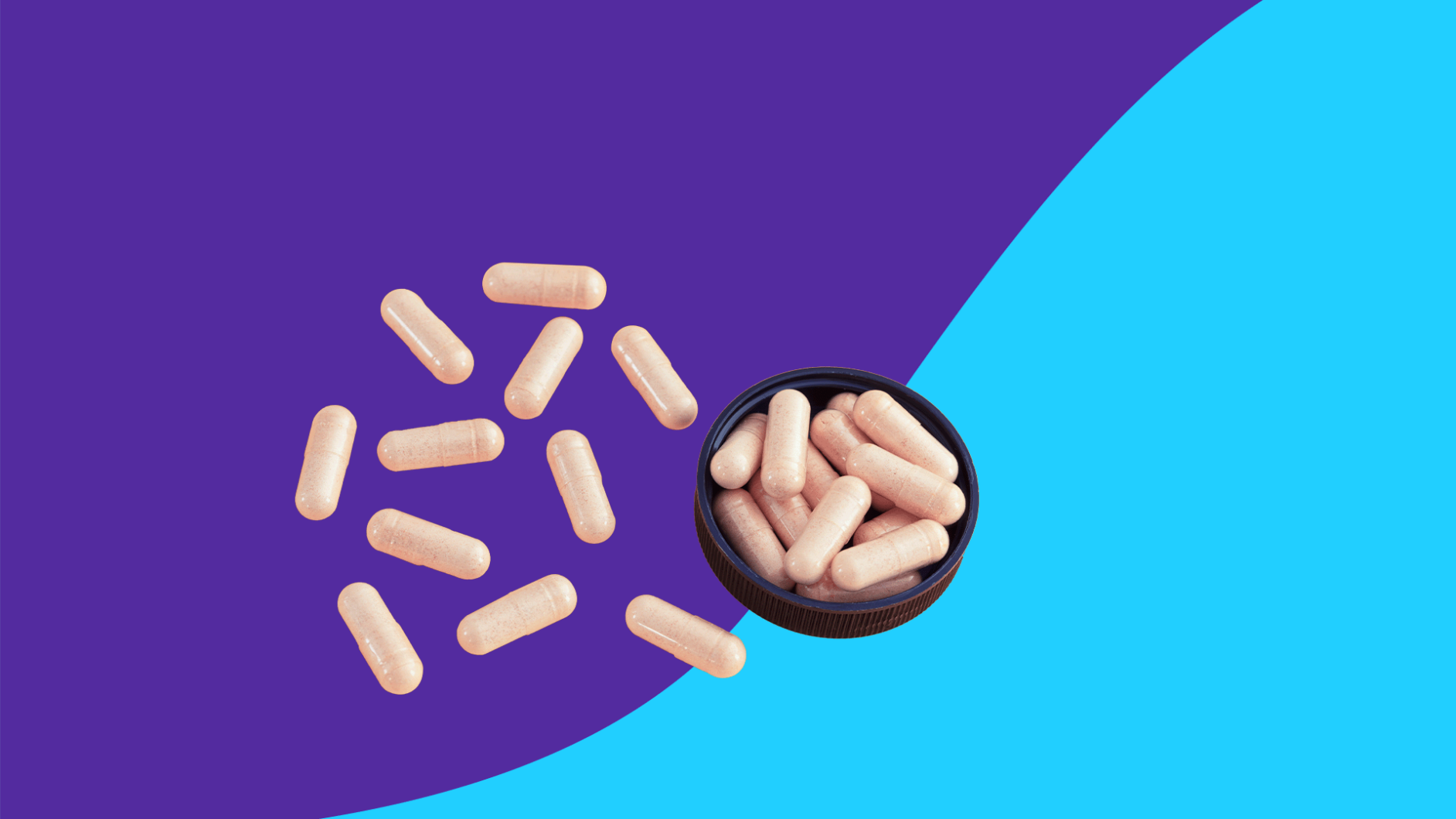“Antioxidant” has become a hyper-common wellness buzzword, slapped on health food packages so often that many people don’t think twice about it. But the power of antioxidants is very real, and if you need a single example of their whole-body health benefits, look to N-Acetyl Cysteine (NAC).
NAC is the supplement form of cysteine—a non-essential amino acid that helps create the important antioxidant glutathione—and it’s exceptionally versatile. A proven counterattack against both free radicals and inflammation, NAC deserves to be researched further to see if it can assist with immune function, liver detoxification, mental health, heart protection, fertility, and even viral infection treatment. Below, we’ll get into the details of NAC’s most intriguing potential benefits.
10 potential health benefits of NAC
Some of NAC’s uses are time-tested and well-documented, like its efficacy in treating acetaminophen overdose. But for other benefits—like any possible mental health and fertility effects—small studies have just begun to scratch the surface. Either way, it’s displayed promise in a range of areas. Here are 10 reasons to speak to your healthcare provider about it.
1. It can boost immune health
“NAC functions in the body by converting to l-cysteine, a nonessential amino acid. This is used to make glutathione,” says Menka Gupta, MD, founder of Nutranourish. “Glutathione is a powerful antioxidant and plays an important role in neutralizing free radicals that can damage cells and tissues.”
Antioxidants are the body’s defense against free radicals, and when these two are out of balance, they cause oxidative stress. This type of stress damages cells in various bodily systems, so antioxidants are an indispensable asset to the immune system. By replenishing perhaps the body’s most powerful antioxidant, NAC may theoretically improve its immune response to numerous conditions.
2. It helps reduce inflammation
Acute inflammation is technically a good thing. It’s the body’s natural response to illness or injury, like when a sprained ankle swells up. But, chronic inflammation has been linked to cardiovascular disease, autoimmune disease, gastrointestinal disorders, and mental illness. In situations like this, NAC might help.
“NAC may help reduce inflammation, which is a key contributor to chronic pain,” says Sean Ormond, MD, founder of Atlas Pain Management. “This effect could be particularly beneficial for conditions like arthritis and neuropathic pain.” Research has found NAC to be potentially effective at reducing inflammation related to a variety of conditions, including heart, lung, gastrointestinal, and infectious diseases.
3. It helps relieve symptoms of chronic respiratory conditions
We often take breathing for granted, and we can thank glutathione for that. Among its most important functions is reducing airway and lung tissue inflammation, possibly preventing long-term lung damage. “In chronic respiratory diseases like COPD and asthma, inflammation and oxidative stress play a major role,” says Dr. Ormond. “NAC helps reduce inflammation and improve lung function by increasing levels of glutathione.”
Patients treated with NAC experience consistently fewer flare-ups of chronic obstructive pulmonary disease (COPD) and chronic bronchitis than patients who go without it, according to a meta-analysis of data published in 2015. But it’s not just a long-term treatment. In a recent review, it was determined to improve inflammation, but it did not consistently improve systemic oxygenation, ventilation duration, and recovery rate when administered intravenously to patients with acute respiratory distress syndrome and acute lung injury. Further study is needed.
It may also help reduce excess mucus in the airway, which could help people with lung disease (like cystic fibrosis) decrease their coughing, wheezing, and other symptoms. However, NAC shouldn’t replace standard treatments.
4. It can protect the liver and kidneys during acetaminophen overdose
Acetaminophen is a medicine-cabinet mainstay for headaches and muscle soreness. It’s harmless at low doses, but taking more than 4 grams per day can overwhelm and damage the liver. This type of overdose is the most common cause of acute liver failure in the United States.
The Food and Drug Administration (FDA) has approved it as a treatment for acetaminophen overdose. If administered orally or intravenously within eight hours of the overdose, NAC is fully effective in protecting the liver and may help prevent secondary kidney damage.
5. It might help treat certain mental illnesses
Mental health is a complex tapestry of neurotransmitters, life experiences, social factors, genetics, and more. Treatments are just as complex. While NAC might not be an all-in-one cure, it could benefit people with certain conditions. Per Dr. Ormond, “NAC helps regulate glutamate, a neurotransmitter involved in mood, learning, and memory. It also supports the production of glutathione, which protects brain cells from damage.” However, he says, “While research on NAC for mental health is promising, it’s still in its early stages. More studies are needed to confirm its effectiveness and determine the optimal dosage for different conditions.”
For example, one study demonstrated the promise of NAC supplementation for treating symptoms of depression, while another concluded that there’s only limited support for NAC as a depression treatment.
Likewise, a recent systematic review on NAC as a bipolar disorder depression treatment found it superior to a placebo, while a separate meta-analysis from 2020 said that NAC didn’t seem to improve subjects’ depressive symptoms.
Some preliminary studies also suggest that, by regulating glutamate levels in the brain, NAC may have a positive effect on substance use disorders for people who use tobacco, alcohol, cannabis, cocaine, and amphetamines.
While the research is limited, NAC shows promise for schizophrenia as well. There’s some evidence it can increase glutathione and decrease glutamate in patients with schizophrenia, and certain small studies suggest it could alleviate symptoms as well when taken with standard medication. These findings have not been consistent in all studies thus far.
For each of these conditions, NAC shouldn’t replace traditional treatments, like therapy and medication, for mental health conditions. However, it could work well alongside them.
6. Improves mental longevity
Neurodegenerative diseases like Alzheimer’s and Parkinson’s have been linked to neuroinflammation, insufficient glutathione levels, and increased glutamate. As an anti-inflammatory and a precursor to glutathione, NAC may help with all three.
Glutathione helps protect cells against oxidative damage, which can progress brain aging. And while glutamate plays a role in memory and cognitive functions, too much can damage cells. By increasing the former and controlling the latter, NAC may improve overall brain health—especially for people with neurodegenerative disease. An overview of many clinical trials concluded that NAC could be considered as an add-on therapy for both Alzheimer’s and Parkinson’s, specifically when prescribed alongside traditional therapies.
7. It may support heart health
The Centers for Disease Control and Prevention estimates that one person dies from cardiovascular disease every 33 seconds in the United States. It’s a serious issue, and even though researchers disagree on NAC’s value as a heart disease treatment, some evidence suggests it might work well. “NAC may help improve the production of nitric oxide, a molecule that relaxes blood vessels and improves blood flow,” Dr. Ormond says. “Additionally, it may reduce inflammation and protect blood vessels from damage.”
One small study from 2015 showed that some people who took NAC for four weeks saw decreases in systolic blood pressure and diastolic blood pressure. Plus, NAC may improve cardiac fibrosis—a condition that can lead to heart failure—and shows potential for reducing heart damage in people with diabetes, according to other clinical studies.
But much like its use in chronic respiratory illnesses, NAC shouldn’t replace any traditional treatments prescribed by a doctor.
8. It may improve fertility in men and women
Infertility can be frustrating and confusing—in part because it has so many potential contributing factors. Antioxidants, however, are considered helpful in helping solve the pregnancy puzzle. While there isn’t scientific evidence that it improves fertility, certain studies have demonstrated that NAC supplements can improve sperm production and motility in men. It produced only insignificant improvement in cases of female infertility as well—specifically women with polycystic ovary syndrome (PCOS). Hope still exists that further research could find utility for NAC in some cases of infertility.
“NAC modulates levels of luteinizing hormone (LH) and insulin, thus promoting regular ovulation. It also supports hormonal balance by reducing oxidative stress and inflammation,” Dr. Gupta says.
9. It can help treat PCOS
PCOS is a fairly common condition characterized by elevated levels of androgen hormones in people assigned female at birth. Its symptoms include irregular periods, excess body hair, weight issues, insulin resistance, ovarian cysts, and sometimes infertility. Not only can NAC potentially increase insulin sensitivity in people who have PCOS, regulating blood glucose, but in some preliminary studies, it has also displayed some efficacy in improving ovulation and pregnancy rates.
10. It may alleviate the symptoms of certain viral diseases
NAC made some waves in 2020 when people began discussing it as a potential treatment for COVID-19. As evidence accumulated, there wasn’t enough to call it a prevention or a cure, but it did show some promise in helping treat its symptoms. Since it can reduce airway inflammation and mucus accumulation in the lungs, some early research linked it to reduced inflammatory markers, as well as increased oxygen saturation and decreased mortality in COVID-19 patients. Unfortunately, these findings were not confirmed, and it is not recommended as a treatment.
While the research surrounding NAC’s role in COVID-19 treatment is still evolving, other research has identified it as a potential supplemental treatment for influenza and tuberculosis, among other pathogens. “Research suggests that NAC works against viral infections by boosting the immune system, reducing inflammation, and preventing the replication of viruses,” Dr. Gupta says.
How to use NAC
N-acetylcysteine is an FDA-approved drug only for acetaminophen overdose but sees off-label use too. It comes in various forms, including capsules, intravenous, and inhalers. Technically, you can get cysteine from high-protein foods like beef, poultry, whole grains, and eggs, but certain conditions may require higher doses. Only oral NAC dietary supplements are available over-the-counter. Intravenous NAC requires a doctor’s supervision, and inhaled versions need a prescription and the use of a nebulizer.
The most common dosage for adults is 600–1,200 milligrams (mg) of NAC per day, but it depends on the person and their health conditions. For example, “People with certain pre-existing conditions, such as asthma or bleeding disorders, should consult their doctor before taking NAC,” Dr. Ormond says. Usage and dosage for children must be individualized as well.
NAC side effects
At doses of less than 1,200 mg per day, side effects of NAC are fairly rare but not impossible. When they occur, they’re often mild, including nausea, vomiting, and skin rash. When inhaled, it may cause oral swelling, runny nose, and chest tightness.
People might not tolerate NAC as well at high doses, like those used for acetaminophen overdose. In these cases, NAC could cause headaches, skin reactions, fever, chills, and, in rare cases, severe allergic reactions.
NAC interactions
When taking N-acetylcysteine, be cautious about its interaction with activated charcoal. Sometimes, doctors use activated charcoal to prevent poisoning in cases of acetaminophen overdose. Using charcoal and NAC together could reduce their effectiveness.
Bottom line: Is NAC good for you?
Inflammation and oxidative stress are bad for the human body. As a precursor to a powerful amino acid, N-acetylcysteine could one day be used for respiratory illness, immune health, cardiovascular wellness, mental disorders, fertility support, and more. There’s only limited preliminary research on some of these potential benefits, and NAC may work best as one part of a multifaceted treatment. But its antioxidant effects and anti-inflammatory properties make it exceptionally versatile.
Sources
- Inflammation, National Institute of Environmental Health Sciences (2023)
- N-acetylcysteine (NAC): Impacts on human health, Antioxidants (2021)
- Influence of N-acetylcysteine on chronic bronchitis or COPD exacerbations: A meta-analysis, European Respiratory Review (2015)
- The effects of N-acetyl cysteine on acute viral respiratory infections in humans: A rapid review, Advances in Integrative Medicine (2020)
- Acetaminophen intoxication: a critical-care emergency, U.S. Pharmacist (2016)
- Acetaminophen toxicity, National Library of Medicine (2023)
- N-acetylcysteine in depressive symptoms and functionality: a systematic review and meta-analysis, The Journal of Clinical Psychiatry (2016)
- The efficacy of adjunctive N-acetylcysteine in major depressive disorder: a double-blind, randomized, placebo-controlled trial, The Journal of Clinical Psychiatry (2014)
- N-acetylcysteine as an adjunctive treatment for bipolar depression: A systematic review and meta-analysis of randomized controlled trials, Bipolar Disorder (2021)
- N-acetylcysteine as an adjunctive treatment for bipolar depression and major depressive disorder: a systematic review and meta-analysis of double-blind, randomized placebo-controlled trials, Psychopharmacology (2020)
- N-acetylcysteine: A potential treatment for substance use disorders, Current Psychiatry Issues (2018)
- N-Acetylcysteine effects on glutathione and glutamate in schizophrenia: A preliminary MRS study, Psychiatry Research: Neuroimaging (2022)
- Meta-analysis of randomised controlled trials with N-acetylcysteine in the treatment of schizophrenia, Australian & New Zealand Journal of Psychiatry (2019)
- Overview on the effects of N-acetylcysteine in neurodegenerative diseases, Molecules (2018)
- Heart disease facts, Centers for Disease Control and Prevention (2023)
- Oral N-acetylcysteine reduces plasma homocysteine concentrations regardless of lipid or smoking status, The American Journal of Clinical Nutrition (2015)
- N‐acetylcysteine attenuates the development of cardiac fibrosis and remodeling in a mouse model of heart failure, Physiological Reports (2016)
- A systematic review on the protective effect of N-acetyl cysteine against diabetes-associated cardiovascular complications, American Journal of Cardiovascular Drugs (2018)
- Antioxidant effects of N-acetylcysteine on the male reproductive system: A systematic review, Andrologia (2021)
- Effects of N-acetyl-cysteine supplementation on sperm quality, chromatin integrity and level of oxidative stress in infertile men, Reproductive Biology and Endocrinology (2019)
- N-acetyl-cysteine as adjuvant therapy in female infertility: a systematic review and meta-analysis, Journal of Basic and Clinical Physiology and Pharmacology (2020)
- The effects of N-acetylcysteine supplement on metabolic parameters in women with polycystic ovary syndrome: a systematic review and meta-analysis, Frontiers in Nutrition (2023)
- N-acetylcysteine for polycystic ovary syndrome: a systematic review and meta-analysis of randomized controlled clinical trials, Obstetrics and Gynecology International (2015)
- N-acetylcysteine for prevention and treatment of COVID-19: Current state of evidence and future directions, Journal of Infection and Public Health (2022)
- N-acetylcysteine reduces severity and mortality in COVID-19 patients: A systematic review and meta-analysis, Journal of Advanced Veterinary and Animal Research (2023)
- N-acetylcysteine: a review of clinical usefulness (an old drug with new tricks), Journal of Nutrition and Metabolism (2021)











